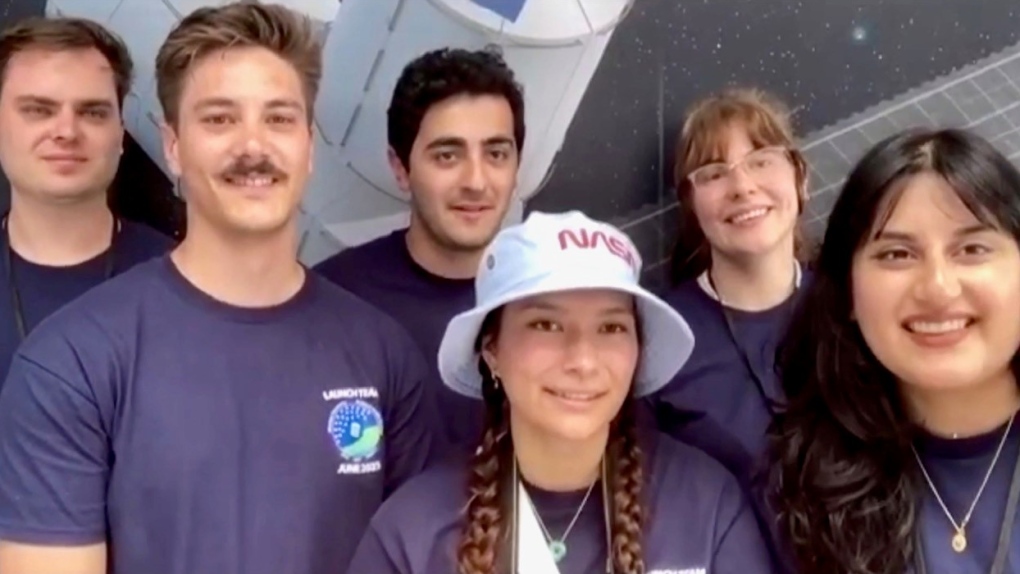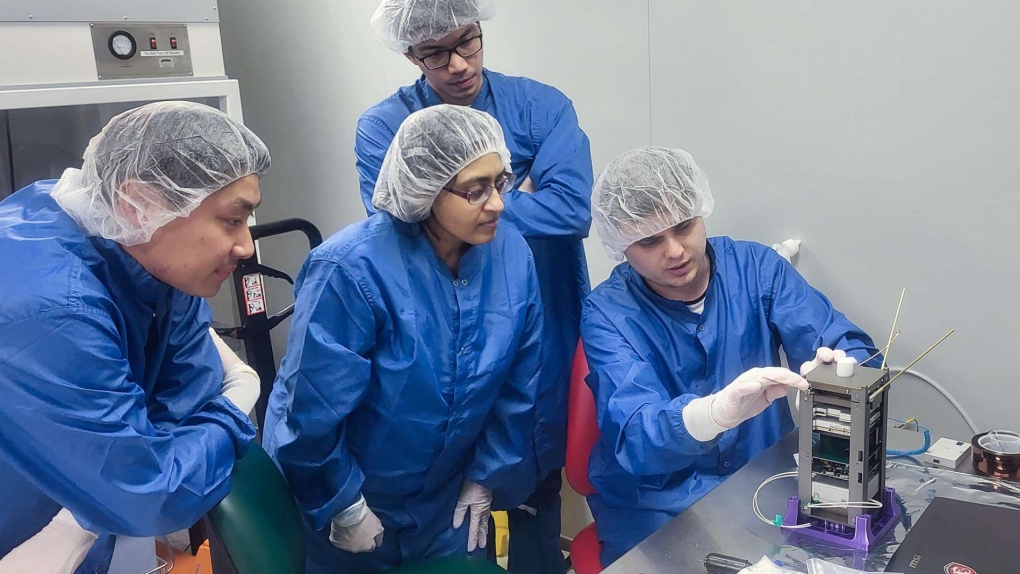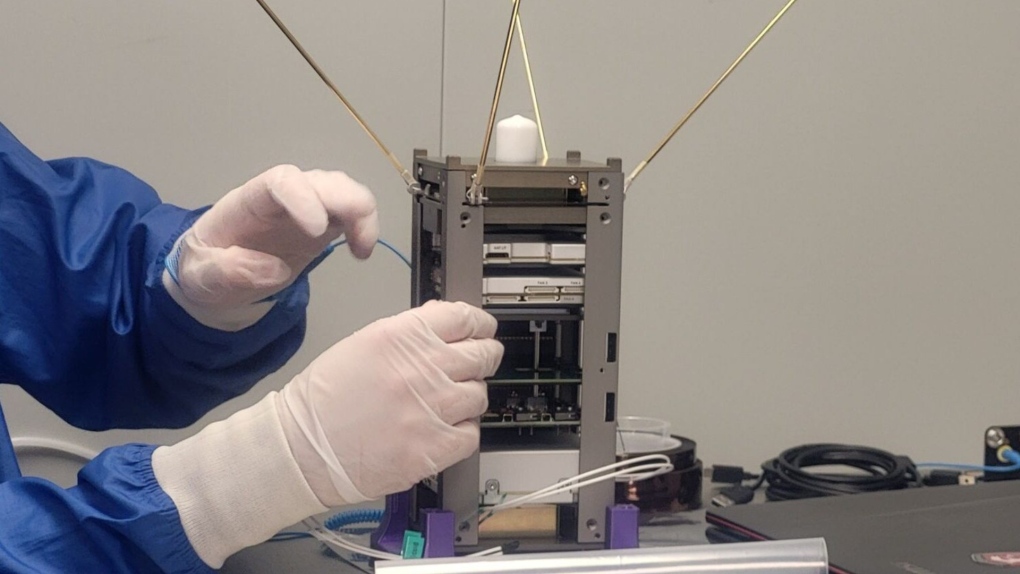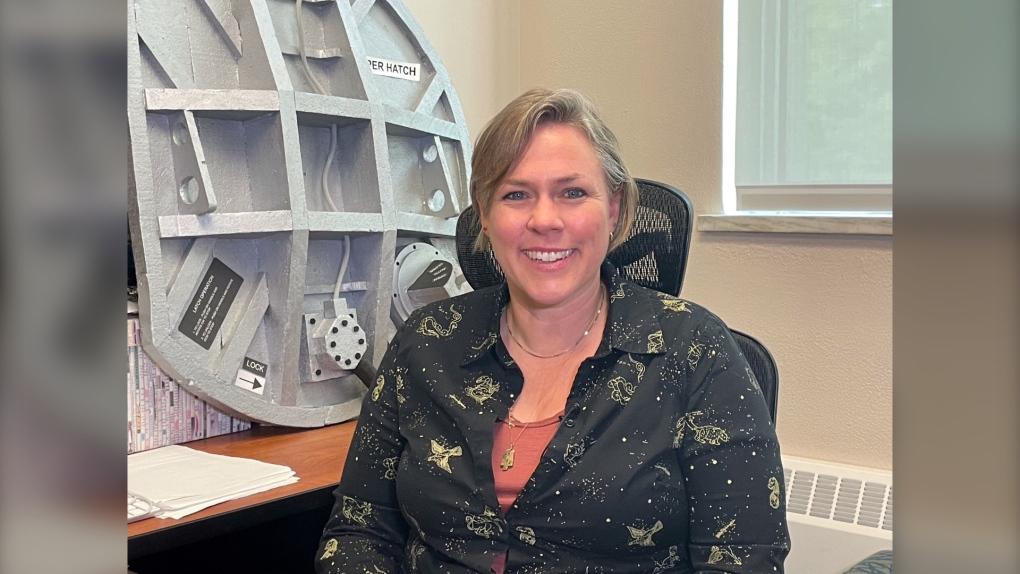Western University mini satellite launched into space Monday
A satellite built by London, Ont.'s Western University has been successfully launched into space.
The micro CubeSat was on board a SpaceX Falcon rocket which left the pad at the Kennedy Space Center in Florida shortly before noon on Monday.
The rocket will link with the International Space Station (ISS).
If the CubeSat survived the launch intact, it will be jettisoned into lower Earth orbit from the ISS within 30 days.
It is the first mini satellite built by 80 students under the leadership of their faculty at Western Space.
Six members of the team were in Florida for the launch. One team member, Hira Nadeem, shared her excitement with CTV News London in an online interview.
 A team of Western University students who helped built a micro satellite are seen after its launch aboard at Space-X rocket at Florida's Kennedy Space Center in this capture from an online interview. (CTV London)
A team of Western University students who helped built a micro satellite are seen after its launch aboard at Space-X rocket at Florida's Kennedy Space Center in this capture from an online interview. (CTV London)
“So overcome with emotion. ‘There it goes!’ I said. I started crying. It was incredible,” she said.
Another team member, Kasia Wisniewski shared, “Just to see the thing that we worked on for so long and so hard go to space. I still couldn’t believe it was happening.”
The CubeSat’s primary purpose is education, said Sarah Gallagher. She is the director of the Institute for Earth & Space at Western.
“That was part of the vision of the program to get lots of hands in to experience a space mission,” she said from her faculty office in London.
Gallagher said the small stature of the CubeSat — which is as big as a Rubik's cube — meets multiple mission objectives, including size and weight restrictions.
 Western University students Wen Bo, Alexis Pascal and Stephen Amey prepare Ukpik-1 for integration with Western engineering professor and principal investigator Jayshri Sabarinathan. (Source: Western University)
Western University students Wen Bo, Alexis Pascal and Stephen Amey prepare Ukpik-1 for integration with Western engineering professor and principal investigator Jayshri Sabarinathan. (Source: Western University)
“And when you have a small satellite, they’re literally about this big, then you know it takes a lot less time to go from start to finish,” she said.
Western has been awarded the opportunity to build a second CubeSat. It will assist in determining bird migration patterns.
The first satellite will be used to send back data and images for the students to research. It will feature new 360-degree cameras.
“We’ll see what these brand new hemispherical cameras can do from space. They’ve never been in space before and to just see how they behave and what they can do for us,” stated Steffen Shaigec, the team’s science lead.
 Ukpik-1, built by a team at London, Ont.'s Western University, being prepared for launch ahead of its June 2023 launch to the International Space Station. (Source: Western University)Construction of the CubeSat took several years.
Ukpik-1, built by a team at London, Ont.'s Western University, being prepared for launch ahead of its June 2023 launch to the International Space Station. (Source: Western University)Construction of the CubeSat took several years.
Gallagher said the biggest challenge was ensuring it would survive the voyage into space.
“You have to build things that are small, light, robust. I mean you can’t fix them once they’re in space,” Gallagher said.
Monday’s launch had been scheduled for Saturday but was scrubbed twice.
The students’ lead faculty member, Professor Jayshri Sabarinathan, was with them but had to fly back to London just before Monday’s launch.
 Sarah Gallagher is the director of the Institute for Earth & Space at London, Ont.'s Western University. (Sean Irvine/CTV News London)
Sarah Gallagher is the director of the Institute for Earth & Space at London, Ont.'s Western University. (Sean Irvine/CTV News London)
CTVNews.ca Top Stories

Back on air: John Vennavally-Rao on reclaiming his career while living with cancer
'In February, there was a time when I thought my career as a TV reporter was over,' CTV News reporter and anchor John Vennavally-Rao writes.
The winter solstice is here, the Northern Hemisphere's darkest day
The winter solstice is Saturday, bringing the shortest day and longest night of the year to the Northern Hemisphere — ideal conditions for holiday lights and warm blankets.
Poilievre writes to GG calling for House recall, confidence vote after Singh declares he's ready to bring Liberals down
Conservative Leader Pierre Poilievre has written to Gov. Gen. Mary Simon, imploring her to 'use your authority to inform the prime minister that he must' recall the House of Commons so a non-confidence vote can be held. This move comes in light of NDP Leader Jagmeet Singh publishing a letter stating his caucus 'will vote to bring this government down' sometime in 2025.
School custodian stages surprise for Kitchener, Ont. students ahead of holiday break
He’s no Elf on the Shelf, but maybe closer to Ward of the Board.
Kelly Clarkson's subtle yet satisfying message to anyone single this Christmas
The singer and daytime-talk show host released a fireside video to accompany her 2021 holiday album, “When Christmas Comes Around” that she dubbed, “When Christmas Comes Around…Again.
Judge sentences Quebecer convicted of triple murder who shows 'no remorse'
A Quebecer convicted in a triple murder on Montreal's South Shore has been sentenced to life in prison without chance of parole for 20 years in the second-degree death of Synthia Bussieres.
At least 2 dead, 60 hurt after car drives into German Christmas market in suspected attack
A car plowed into a busy outdoor Christmas market in the eastern German city of Magdeburg on Friday, killing at least two people and injuring at least 60 others in what authorities suspect was an attack.
16-year-old German exchange student dies after North Vancouver crash
A 16-year-old high school student from Germany who was hit by a Jeep in North Vancouver, B.C., last weekend has died in hospital, authorities confirmed.
Poilievre to Trump: 'Canada will never be the 51st state'
Conservative leader Pierre Poilievre is responding to U.S. president-elect Donald Trump’s ongoing suggestions that Canada become the 51st state, saying it will 'never happen.'

































